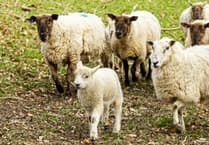In the wake of much anticipation and uncertainty, last week the US and UK reached an initial agreement on trade and tariffs.
However, despite President Trump's characterisation of the announcement as a "major trade deal" on social media, its significance and scope remains debatable, with the agricultural sector still grappling with the potential ramifications.
Beyond tariff reductions or removals on UK exports such as cars, steel, and aluminum, agriculture was a key component of the deal. The US secured enhanced access to the UK agricultural market, notably gaining tariff-free quotas for 13,000 tonnes of US beef and for ethanol. In return, the UK received an equivalent beef quota at a reduced tariff rate, aligning it with other nations.
Throughout these trade talks, the Farmers' Union of Wales (FUW) repeatedly stressed that Welsh agriculture must not become collateral damage in the UK Government's pursuit of short-term trade concessions with the US. Crucially, the FUW emphasised the importance of preventing Welsh farmers from having to compete with cheap, sub-standard US imports, such as chlorinated chicken and hormone-injected beef.
The UK Government has been adamant in its assurance that this agreement will not compromise food, environmental, or animal welfare standards, which we appreciate. Such assurances are in keeping with the stated intention of the UK Government to ‘smooth’ the current trade deal in place with the EU, and whilst we acknowledge the opportunities this deal provides for Welsh farmers in opening a potential new market for our world-leading produce, the size differential between our European markets and limited opening for beef exports to the US should not be ignored.
However, much apprehension remains in the industry regarding the agreement and its potential impact on Welsh farmers. While assurances regarding food safety (Sanitary and Phytosanitary) standards are welcome, as the FUW has highlighted on several occasions, a significant distinction exists between food safety and food production standards. Just because food is deemed safe to eat, does not mean it has been produced to the equivalent of our high production standards - and ultimately any deviation risks undermining Welsh farmers and the high production standards they maintain.
The FUW therefore emphasised that comprehensive and unambiguous country-of-origin labeling is vital to ensure the UK public can make fully informed purchasing decisions. Furthermore, meticulous scrutiny and policing of imports is non-negotiable in ensuring they meet the correct standards. A weakening in standards would constitute a betrayal of Welsh farmers, the food sector, and potentially undermine any future trading relationship with the EU.
Over recent years, Welsh farmers have too often borne the brunt of trade deals forged with countries that prioritise different food production standards. These have undermined UK food production, whilst delivering little return in regard to new markets or tangible opportunities. We will therefore withhold our final view of this deal as the dust continues to settle on this latest agreement.





Comments
This article has no comments yet. Be the first to leave a comment.